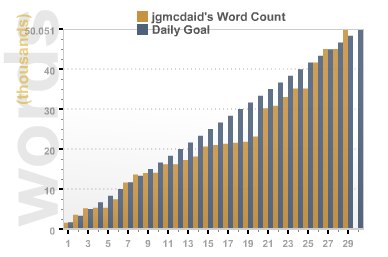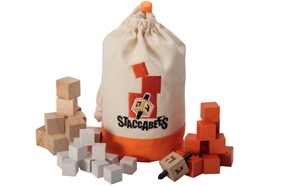 With a day to spare, and just 50 words of headroom, I crossed the finish line of the National Novel Writing Month (NaNoWriMo) at 12:05 this morning, certifying my scrambled manuscript for the alternate history novel "Fist of the Ape," written in the past thirty days. I won't pretend it was easy, nor that it would have been possible without the support of my family, friends, and the awesome Wrimos in Rhode Island and beyond.
With a day to spare, and just 50 words of headroom, I crossed the finish line of the National Novel Writing Month (NaNoWriMo) at 12:05 this morning, certifying my scrambled manuscript for the alternate history novel "Fist of the Ape," written in the past thirty days. I won't pretend it was easy, nor that it would have been possible without the support of my family, friends, and the awesome Wrimos in Rhode Island and beyond.
I will confess that there was a very bad point this afternoon when I realized that I had counted about a thousand words twice. It very nearly kicked my ass, when I thought I was at 48K and was really only at 47. But with some encouragement, I cranked six thousand words to put this thing to bed.
Thanks to Karen, for putting up with a month of craziness (and for being polite, when reading the manuscript, and saying only "I can tell where you had the flu..."), and Jack, who didn't have as much homework time with daddy. I will make it up to you. Thanks to the gang at the Gibraltar Point science fiction workshop (you know who you are) where I plotted the outline for this book three years ago. And a special shout-out to hazwastegirl, who made writing sprints at the Warren Coffee Depot such crazy fun.
And now, because I have to share, the only marginally publishable copy. (Which is to say, uh, I actually edited this...)
Synopsis: Fist of the Ape
In an alternate WWII, a US weapons expert and his code-talking sidekick pair up with a Russian spy to track down a possible Nazi atomic bomb.
Excerpt: Fist of the Ape
Manhattan, July 28, 1945, 9:40am
People on the streets recalled hearing the airplane first; a big Army bomber from the sound of it, coming in from the East River. They might have looked up, but couldn't even see the tops of buildings in the drifting cloud deck. The plane was clearly over the city, they remembered, and far too low.
In the Empire State Building, the Saturday shift of the Catholic War Relief Board was beginning their work day. Perhaps they caught a rumble of approaching engines; there might have been time for a glance out the window.
Then the bomber emerged from the fog and struck head-on.
Twenty tons of airplane plowed through the limestone facade and exploded into the building; the B-25 came apart in a fireball, sending a hailstorm of wreckage tearing through offices. The workers, a typical wartime mix of old men, teenagers, and nuns, were killed at their desks, crushed or incinerated.
The left engine penetrated the elevator core, sheared cables, and plummeted to the basement.
One heavy chunk of wreckage passed entirely through the 79th floor, blowing an exit wound in the south wall and plunging across 33rd street to bury itself in the top floor of a warehouse.
When the Office of Strategic Service agents arrived, they had no time to listen to witnesses babbling excitedly to the cops, and they had only the briefest glance for the smoking hole in the side of the skyscraper. None of that was important. The debris across the street was all that that was of interest to them.
 If you're looking for a way to liven up your Hanukkah games of dreidel — and, let's face it, who isn't — you'll want to check out Staccabees™, a new twist on the classic that combines skill and strategy with the traditional four-sided top. Instead of taking and putting chocolate coins, players add or remove different-sized wooden cubes from a stack, depending on the roll of the dreidel.
If you're looking for a way to liven up your Hanukkah games of dreidel — and, let's face it, who isn't — you'll want to check out Staccabees™, a new twist on the classic that combines skill and strategy with the traditional four-sided top. Instead of taking and putting chocolate coins, players add or remove different-sized wooden cubes from a stack, depending on the roll of the dreidel. With a day to spare, and just 50 words of headroom, I crossed the finish line of the National Novel Writing Month (NaNoWriMo) at 12:05 this morning, certifying my scrambled manuscript for the alternate history novel "Fist of the Ape," written in the past thirty days. I won't pretend it was easy, nor that it would have been possible without the support of my family, friends, and the awesome Wrimos in Rhode Island and beyond.
With a day to spare, and just 50 words of headroom, I crossed the finish line of the National Novel Writing Month (NaNoWriMo) at 12:05 this morning, certifying my scrambled manuscript for the alternate history novel "Fist of the Ape," written in the past thirty days. I won't pretend it was easy, nor that it would have been possible without the support of my family, friends, and the awesome Wrimos in Rhode Island and beyond.

